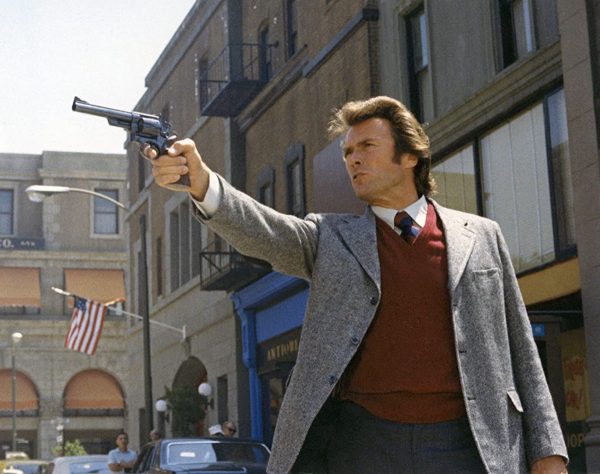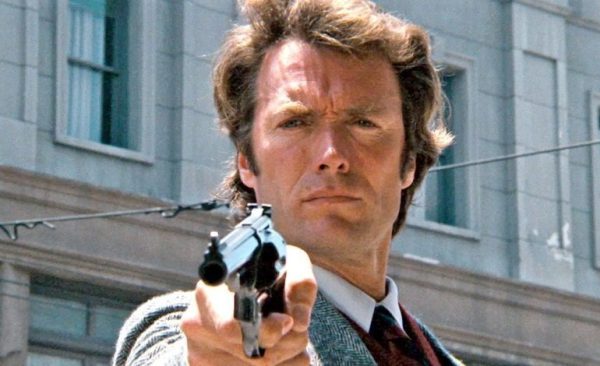Dirty Harry, 1971.
Directed by Don Siegel.
Starring Clint Eastwood, John Vernon, Andrew Robinson, Harry Guardino, John Mitchum, Ruth Kobart, Reni Santoni.
SYNOPSIS:
A psychopath named Scorpio terrorizes San Francisco, so the force send uncompromising cop ‘Dirty’ Harry Callahan to do what he does best.
There is always a danger when revisiting a classic movie several decades after it originally came out that it might not hold up, that the social politics and values it held at the time may not reflect where the world is right now, and that attitudes may have changed so much to render said movie irrelevant and a relic of a bygone age that we can look back at and say it was a different time. And then there is Dirty Harry.
Released as part of a collection of Clint Eastwood’s more notable titles, this 4K UHD debut for arguably the actor’s most famous role represents more than just a spit and polish job on a old movie. Indeed, as part of this series of releases, his 1985 western Pale Rider is also getting a sparkly 40th anniversary package, but as the man himself nears his mid-90s and shows no sign of slowing down, it also gives us a chance to reappraise it and see why a violent cop movie from the 1970s is still as relevant today as it was back then.
The obvious taboo that the movie broke back in 1971 was that the cops were not always ‘good’ guys. Up until that point in Hollywood, it was always clear that cop were the goodies and the thieves/murderers were the baddies, and the boundaries around the two never crossed. But in the same way that Eastwood blurred the lines between character motives and behaviours in his spaghetti westerns – creating the cinematic antihero of The Man with No Name and incurring the wrath of all-American hero John Wayne in the process – he did the same here for the cop movie, making gruff, tough and dangerous-to-know Inspector ‘Dirty’ Harry Callahan one of the most intriguing and complex characters in all of cinema.
Callahan is the man we don’t necessarily like or want but he is the one that we need, as the justice system fails to protect innocent civilians from criminals. This division between the law and justice is represented by Scorpio himself, as Andrew Robinson puts in a suitably whiny performance as the killer who knows his rights. Harry, of course, doesn’t give a damn about Scorpio’s rights, and despite the fact he has the suspect in custody, the murder weapon and witnesses, the courts let the killer go as the law says it isn’t enough to convict.
When Harry has Scorpio injured and held at gunpoint, Robinson goes from threatening violence against Harry to crying about violence against himself in an instant, and ‘innocent until proven guilty’ goes out of the window as Harry presses on the injury to make him squeal. As an audience, we know Scorpio is guilty but Andrew Robinson makes him so detestable with his cries of “I know my rights!” that you want Harry to press his foot a little bit harder on that bullet wound. So not only does it say a lot about the cops and the criminals, it also holds a mirror back to ourselves and a perceived mob mentality that exists whenever we see injustice.
But that was back in 1971, so how is it still relevant? Well, one quick scour of social media sites can give you a dozen Scorpios; not killers, but people who can light a fire and walk away, claiming to be a victim when they get called out for it. Is there a Harry Callahan nowadays to come and keep the rest of us safe? That’s a discussion for another day, but the fact we still root for Harry – because we know he is a good man at heart – is what keeps us coming back to him. Add to that the perfect transition of the bright and carefree 1960s into the grim and gritty 1970s, with all the sex, violence and cynicism that came with it in the movies, then you have the perfect recipe to set up the action genre for at least the next decade – just look how many Italian knock-offs there were in the wake of this movie.
Chances are that if you are going to pick up this new edition of the movie then you are already familiar with it, so what have Warner Bros. done to make it worth another look? For a start, the image quality is fantastic. It still looks like a movie from the 1970s, with lots of beige/brown colour schemes and some grain, but the edges are sharp, the detail clear and the exterior shots of San Francisco are gorgeous. There are moments of camera judder, the image being slightly out of focus and some odd lighting choices, but these have always been there and are part of the original material, so thankfully no AI cleanup was involved.
The Dolby Atmos audio is suitably aggressive and thumping, especially when Lalo Schifrin’s funky, percussive score kicks in and whenever Harry shoots his .44 Magnum, but longtime fans will be pleased to know that Warner’s have also included the original mono mix, which won’t push your speaker’s range or performance but it does lend an air of authenticity to the movie, giving a more balanced soundtrack. Both tracks have their pros and cons, so it is up to your personal preference, but it is a nice touch that both were included.
The disc comes loaded with special features, including an audio commentary by film historian Richard Schickel, several Clint Eastwood career retrospectives, featurettes on the significance of Dirty Harry in cinema, archive featurettes and interviews with cast members and famous fans, including Clint Eastwood, Andrew Robinson, Hal Holbrook, Arnold Schwarzenegger and John Milius. If you manage to pick up the collector’s edition you also get replica ransom notes, postcards, posters and a street map of San Francisco amongst various other paraphernalia, but the discs in all editions contain the same special features.
As previously stated, most fans already know if they are going to buy this and won’t need persuading, but if you are new to either Harry Callahan or Clint Eastwood then this is probably the best place to start if you want to see why Dirty Harry is held up as a classic. Yes, the fashions may change and we may not use some of the language that gets said anymore, but in an uncertain world we still need Harry Callahan to come and clear up the streets and keep us safe, regardless of his methods. In cinematic terms, without him we don’t have Snake Plissken, John McClane, Judge Dredd or even Batman in his current dark and brooding interpretation, and the whole action/thriller genre would have taken a very different turn, so be glad that he is still able to cast such a commanding figure in the world of cop/action/thriller movies, and also be thankful that nobody has seen fit to remake it (yet), because such is the power and relevance that the original still wields that there is no need to. Long may that continue to be the case.
Flickering Myth Rating – Film: ★ ★ ★ ★ ★ / Movie: ★ ★ ★ ★ ★
Chris Ward
















